Angela Thompson is the Library Lead Teacher at Remarkables Primary School in Queenstown, a school of 600 students. She began working as a literacy lead teacher upon moving to New Zealand, and is particularly passionate about the value of author visits to schools.
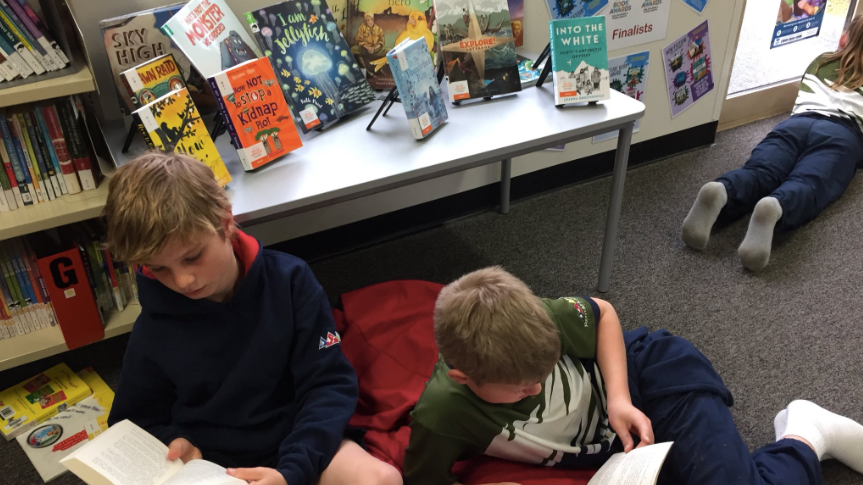
I am Library Lead Teacher at Remarkables Primary School in Queenstown; we are a relatively new school having only been open for around 9 years. We cater for Year 1-8 and have approximately 600 students on our roll at the moment.
I also teach full-time across Year 1-5, mostly teaching Maths.
I have been a teacher librarian or Literacy Leader for most of my career since coming to New Zealand in 2006. I work really closely with our library assistant, Nadine. I could not manage without her, as she is an amazing librarian as well as an avid reader and book-lover. She comes from a public library background. She is amazing at her job and we both love books and reading. We share ideas and get together as much as we can to look at book promotion, library displays and purchases. We make a great team and achieve lots through quick conversations, emails and our weekly meetings. Nadine does most of the buying and day to day tasks in the library. She is also the person our students see when they visit our library at lunchtime.
I have loved books and reading for as long as I can remember, but didn’t really love libraries, because I didn’t use them, until the role was given to me by my first NZ Principal in 2006. I have always been a book-buyer rather than a book-borrower, as I am an avid re-reader. At the time I left teaching in England in 2005, none of the schools that I taught in had libraries. When I was given my library leader role ‘because I know you love to read,’ I was enrolled on every National Library course for the next couple of years as well as given release time to plan for a new-build library. That is how I went from being a book-buying lover to loving the school library roles I have been involved in. That was really the start of my journey with libraries.
What inspires me is sharing something I love to do with others, and helping them to find books they love to read. I took on the role of library leader from the view of a reader as opposed to a teacher. I looked at how we could improve our collection, promote our library and create our new-build library based on what I would like the library to look like, the books I would like to read and things that would entice me to want to read books.
I took on the role of library leader from the view of a reader as opposed to a teacher.
The inspiration and enjoyment of the role has increased as I have learned more about it. My biggest influence was the National Library facilitators in Auckland. I would leave every course or meeting, at what used to be the National Library building in Newmarket, inspired to try new things, research what would improve our school library and how I could get students into reading as much as possible. The facilitators’ knowledge of children’s books just amazed me, and things just went from there.
Now, with the experience I have, my inspiration comes from wanting to motivate students in Literacy as a whole, not just reading. When I teach writing I will often use a book as a starting point. Great books inspire great writing, art and a love of reading in students. Brian Falkner’s Super Freak has the most amazing book beginning in the form of making you want to read on. I often use this when teaching the Writers’ Hook to students.
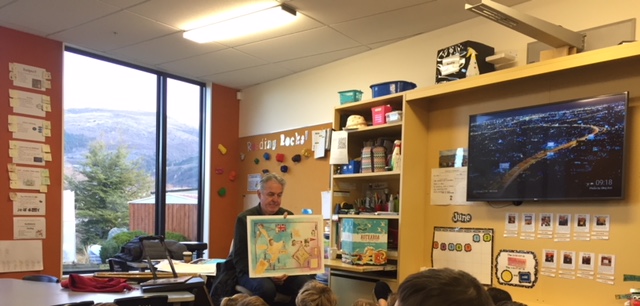
Fuzzy Doodle by Melinda Szymanik and Donovan Bixley is great for inspiring art that pays attention to detail. There are so many amazing books can be a hook and inspire students to do great work. Promoting reading for pleasure also inspires me. In schools, we often look at reading as academic and our class teachers and Reading Recovery teachers do a fantastic job of ‘teaching reading’.
I strongly feel that any library’s job is to teach reading for pleasure, instill a love of reading in as many students as possible by sharing the books we love, and recommending books and authors we think they will love. We aim to take away the rules around reading. Everyone should be allowed to re-read books if they love them, to dip in and out of different books, to stop reading a book they are really not enjoying and to read magazines, articles, etc – I always tell our students that I don’t care what they read as long as they are reading and loving it.
I strongly feel that any library’s job is to… instill a love of reading in as many students as possible by sharing the books we love, and recommending books and authors we think they will love.
Acquiring literacy is an empowering process
I love these two quotes about reading, I actually love lots, but these are the two I love the most and mean the most to me in my librarian role:
‘Knowing you have something good to read before bed is among the most pleasurable of sensations.’ – Vladimir Nabokov
‘Acquiring literacy is an empowering process, enabling millions to enjoy access to knowledge and information which broadens horizons, increases opportunities and creates alternatives for building a better life.’ – Kofi Annan
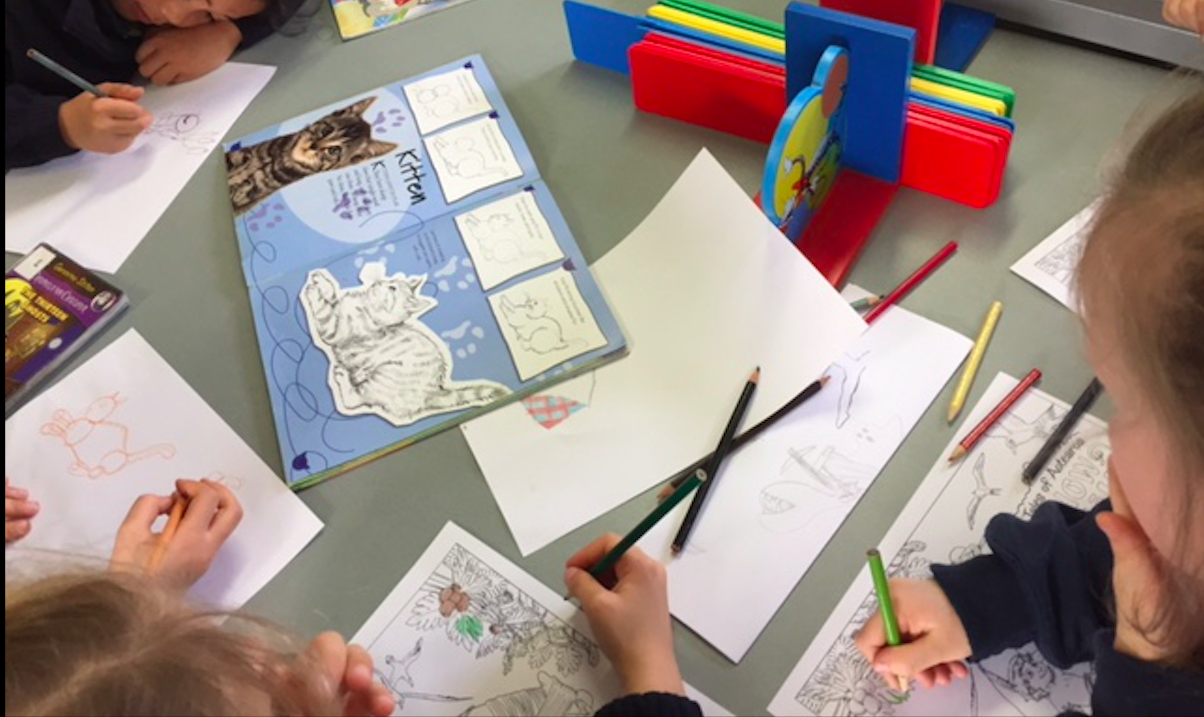
I think teachers and librarians have a huge responsibility to children. Firstly, we have to teach students to read so they may function in day to day activities and gain knowledge and information so they may continue to learn, which relates to the Kofi Annan quote. And secondly, we need to (we have an obligation to) instill a love of reading and promote reading for pleasure in students.
We need to do everything we can to let students see that books are their friends and that they can not only learn so much from stories, but they can also get real pleasure from being absorbed in a really great book that they love. It’s about finding a book that they really want to finish to find out what happens, but also that they never want to finish because they love it so much they never want it to end. I am certain that reading for pleasure is the most important thing we can give to a child.
We need to do everything we can to let students see that books are their friends and… they can also get real pleasure from being absorbed in a really great book that they love.
Children’s books and the amazingly clever people who write and illustrate them have such an essential role. Once children learn to love reading, many opportunities open up for them. Students experience a whole range of different emotions through a book, and if they are truly engrossed, they love the characters and learn about empathy and relating to others, as well as experiencing a whole range of emotions.
It is so important that children see adults as positive role models promoting reading for pleasure. My own children love to read, and I am sure this is because they have grown up seeing me sprawled on the couch or lying in the sun on warm days completely engrossed in a book. ‘
Sharing our love of reading and books is so important with the students we teach and their families. Students’ faces just light up when you can say to them something like, ‘I read this book and thought of you; I think you would love it.’ Our library assistant, Nadine, is amazing at this with our students and staff.
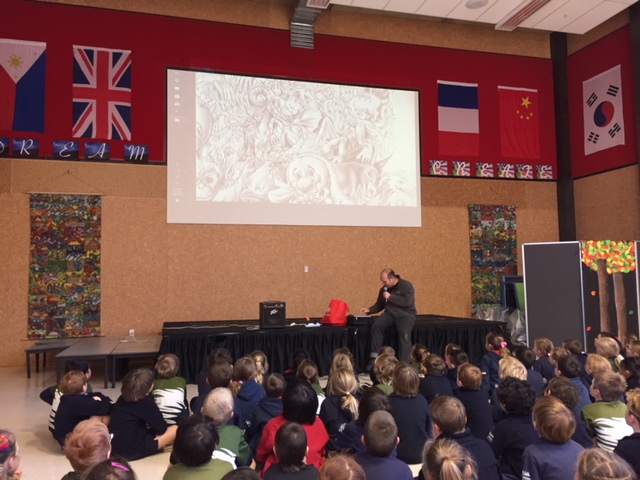
At the moment I am reading The 39 Storey Treehouse with a Year 2 & 3 class, and I have a good giggle at parts and the children just love it when I can’t read anymore because I am laughing. Reading aloud is also so important, and not just with younger children. When you read to children they hear a book read in a different way to which they may have read it themselves – they also see your enjoyment and enthusiasm for what you are reading. It evokes quality conversations and sharing of opinions.
We think students should be enabled to read what they want, how they want. It doesn’t matter if a student comes the the library every day and pulls the same book off the shelf, they are reading for pleasure, and they are choosing to read, and that is all that is important.
Our Library
Our library is organised into fiction and non-fiction. Our fiction includes picture books, puzzle books, bilingual books, sophisticated picture books, graphic novels and puzzle books. We work hard on making the library as accessible and easy to navigate as we can so that students can find what they want. We try not to change the general layout too much, so our little people don’t get confused, but if we feel students are not finding or using certain books then we will move these or promote them.
We change our displays regularly and we alternate between new books and displays by author or topic, such as the recent book award nominations and winners. We have recently introduced ebooks which are proving very popular, so we now also promote our online presence through our library web page which contains a link to e- and audiobooks as well as recommendations for reads.
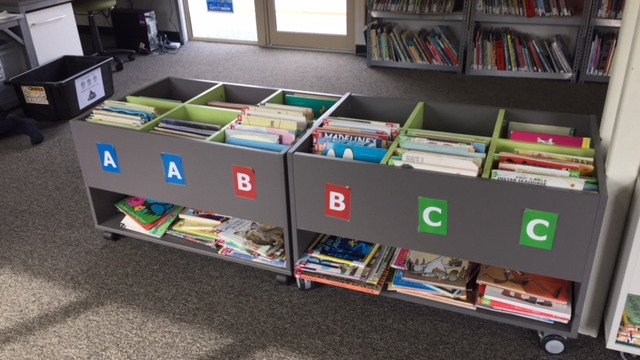
We also try to stay away from categorising books too much, like calling sections “Quick Reads” or “Early Chapter Books”, as we don’t want students to shy away from reading anything that may appeal to them because they think it may be thought of as unsuitable.
This year we have been working on our online presence – integrating Wheelers ePlatform into our collection, setting up our library webpage and Twitter page – Phew!
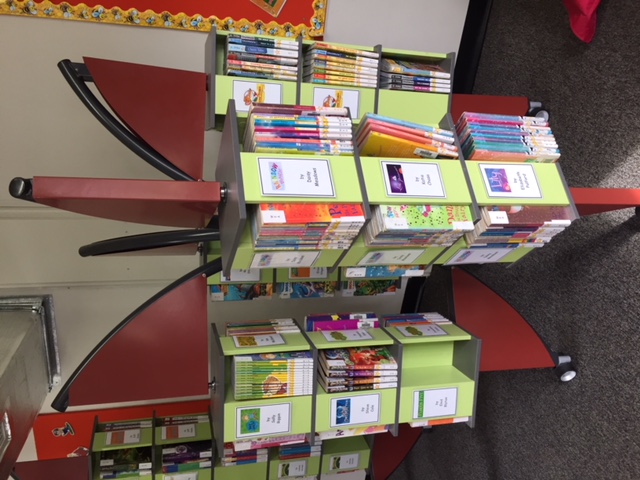
The importance of author visits
We try to have an annual Book Week where we promote reading in a fun way with dress up days, activities and competitions. A big part of our Book Week is always author visits. And I would say that author visits are our most successful reading promotion and will continue to be! We love hosting such talented people who are willing to share their knowledge and ideas with us. Our students really respond well to visitors and we always notice a huge increase in borrowing after an author visit. We have been extremely lucky with author and illustrator visits, thanks to having an extremely supportive Board of Trustees and Leadership Team who see the importance of students seeing authors as real people as well as writers, and through working with authors and illustrators seeing themselves as writers.
We try to have a variety of workshops and author talks so that students don’t just listen to our visitors but also work with them, have discussions and gain their insights and feedback. Bruce Potter, Scott Tulloch and Donovan Bixley have all lead illustrator workshops with students, while Gavin Bishop and Kyle Mewburn have talked through the processes of making a book, including working alongside publishers. Maria Gill, Melinda Szymanik and Brian Falkner have all run writing workshops for older students.
We try to have a variety of workshops and author talks so that students don’t just listen to our visitors but also work with them, have discussions and gain their insights and feedback.
The NZ Book Council are really supportive when we are hosting visitors and if we are bringing visitors to Otago we will often organise a tour of local schools to enable us to share costs and resources.
Gavin Bishop recently visited, and our students were completely spellbound when he showed the original artwork from Aotearoa, and it was amazing to sit and listen to all his local knowledge of our area and all the childhood memories he shared from his time in Kingston. I attended a couple of talks with our students and also Gavin’s presentation at our public library and the level or engagement and enthusiasm for his work and knowledge from both students and their families was awesome to watch.
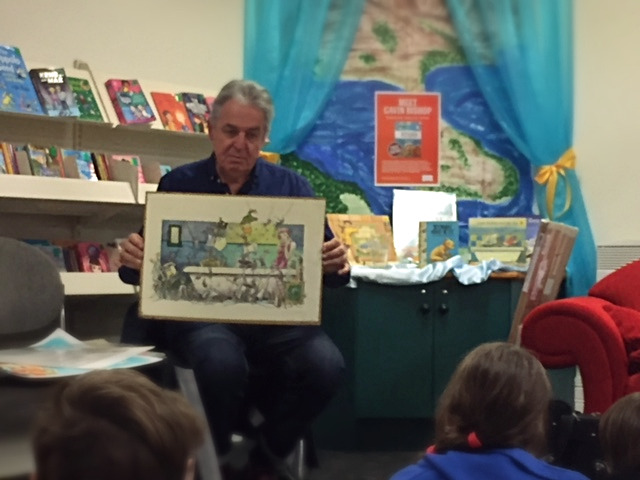
Students will often pick up a library book and say something like, ‘Do you remember when Bruce Potter taught us how to doodle?’ or ‘when Kyle Mewburn pretended to disappear and do magic, but she really was hiding behind the whiteboard?’ Students will come into the library and search for books by visiting authors, take them home and share with their families. Some of our Year 7 and 8 students still talk about writing skills they were taught by Brian Falkner when they were Year 4 and 5 students in 2015!
We also try, where possible, to have authors run workshops for teachers, so we can up-skill in our own practice and give children experiences in Literacy which they will be passionate about, remember, transfer and use again and again.
Our author visits bring more books into homes, encourage book dialogue in families and allow our students to see themselves as writers and illustrators. I can’t think of any other promotion that could come close to the success we have had from our visits.
Our author visits bring more books into homes, encourage book dialogue in families and allow our students to see themselves as writers and illustrators.
The cost of books
I think we are so lucky in New Zealand to have such a wide range of home-grown talent for us to enjoy and I think our libraries and bookshops do a great job of promoting children’s books. I love how you can walk into any bookshop or library when the NZ Book Awards for Children & Young Adults ceremony is almost here and see displays of all the finalists. You see ANZAC displays in April, and great choices for holiday reading at the beginning of the school holidays, alongside colouring competitions and puzzle books. I love how publishers in New Zealand have such a great variety of quality fiction and non-fiction for children and how books are published to a really high standard. It is also great to see so many titles published in Te Reo Māori.
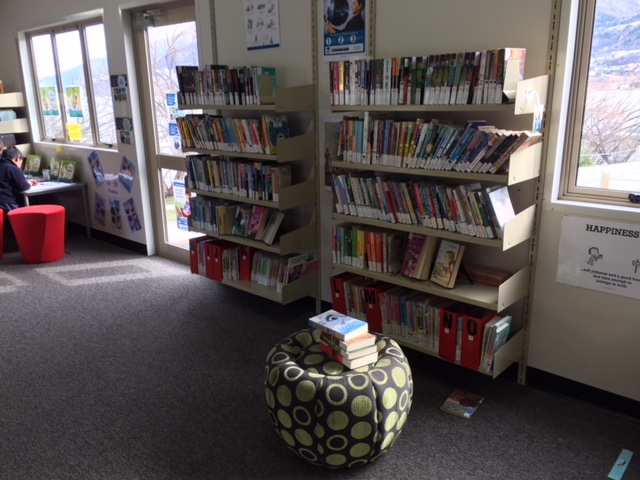
I would really love to see books in New Zealand to be accessible to everyone. I think late fees at libraries should be waived for children’s books so no child ever feels like they can’t go to the library because their book is late. I also get extremely annoyed at the cost of books in our country. Very, very angry at times when I really look forward to a book being released and I can’t wait to read it, but when I get to the book shop it costs around $40. How can we encourage people to pick up and enjoy a book when they are so expensive?
I think that Children’s and Young Adult books should be seen as essentials and therefore be exempt from GST. This way we could get more books into homes and more children and adults reading for pleasure.
I think that Children’s and Young Adult books should be seen as essentials and therefore be exempt from GST.
The library’s latest favourite books
Nadine and I see a book, buy it for the library and then show it to the whole world and say they have to read it. Our local book shop recently recommended Echo, by Pam Munoz Ryan. Nadine read it first and said I had to read it. I read it twice, back to back, and we are now sharing this around our staff.
I have also been showing How Maui Fished Up the North Island by Donovan Bixley and the new Shaun Tan book Cicada to a lot of staff and students, as I completely loved both as soon as I saw them. If we see a book we love or a book by an author we love we tend to promote, promote, promote to get as many of our staff and students reading it as possible.

Angela Thompson
I am Library Lead Teacher and full-time Teacher at Remarkables Primary in Queenstown. I love to read - obviously, spending time with my family, being dragged on long walks by our completely hyperactive labrador. I am completely addicted to my fitnesses and anything and everything Disney - so I’m always planning my next trip!



